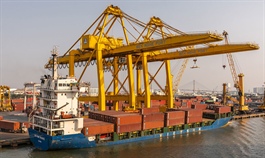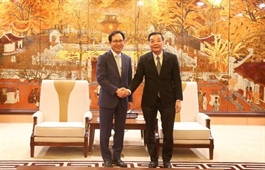Draft amendments to Decree 52 on e-commerce activities discussed
Draft amendments to Decree 52 on e-commerce activities discussed
Despite the effects of the COVID-19 pandemic, the Vietnamese e-commerce market is still booming. Therefore, the amendment and supplementation of Decree 52/2013/ND-CP on e-commerce to better manage the activity, considered "the future of the retail market", is extremely necessary. 
The Viet Nam Chamber of Commerce and Industry (VCCI) recently co-ordinated with the Ministry of Industry and Trade to organise a seminar commenting on the draft amendment of the decree.
The Vietnamese e-commerce market includes big names such as Shopee, Lazada, Tiki and Sendo. During the COVID-19 pandemic, e-commerce platforms recorded double-digit growth.
With a market of nearly 100 million people and stable socio-economic growth, e-commerce in Viet Nam is considered to be full of potential. Many foreign investors have poured billions of dollars of investment into these sites.
Experts also emphasised the importance of the revised Decree 52 to manage but not restrain the explosive growth of e-commerce activities in Viet Nam.
Chu Thi Hoa, deputy head of the Institute of Legal Science under the Ministry of Justice, stated that the policy of the State was to promote digital economic development.
The Ministry of Industry and Trade should be cautious in amending some points of Decree 52, especially in matters that have a profound impact on foreign investors and enterprises and those which may cause difficulties for business operations.
Meanwhile, Sendo Chairman Nguyen Dac Viet Dung raised concerns about the regulations on market access conditions of foreign investors from the perspective of domestic enterprises which need access to capital to develop amid fierce competition.
As e-commerce is a field which needs significant capital, Vietnamese businesses without a parent company with strong financial potential would not be able to develop and compete as they are only allowed to access capital from the narrow list of investors announced periodically by the Ministry of Industry and Trade, he said.
In addition, the draft decree also eliminated the participation of the group of investors, which are foreign investment funds, which are one of the types of investors with abundant capital and experience to support local businesses to develop strategies, operations and human resources.
Doan Tich Tu Phuoc, MoMo representative in Ha Noi, said that tightening cross-border transactions would reduce the attractiveness of e-commerce in the country.
The long-term consequence was that domestic e-commerce sites might have to make room for the operation of overseas e-commerce companies such as Amazon, Aliexpress, or Facebook, which were not subject to Vietnamese law.
Consumers buying goods on these platforms would also not enjoy protection and support policies from domestic e-commerce trading floors.

























